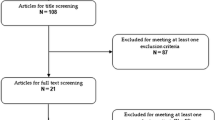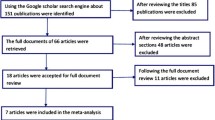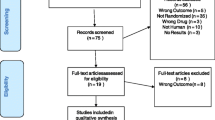Abstract
No comprehensive meta-analysis has been performed concerning the efficacy and tolerability of Z-drug adjunctive therapy in antidepressant-treated major depressive disorder (MDD) patients. Randomized, placebo-, or antidepressant-alone-controlled trials of Z-drugs in MDD patients were included. The primary outcome measures for efficacy and safety were remission rate and all-cause discontinuation, respectively. The secondary outcome measures were response rate, Hamilton Depression Rating Scale (HAMD) total score improvement, discontinuation due to inefficacy and adverse events, and individual adverse effects. Risk ratio (RR), number needed to treat/harm (NNT/NNH), 95 % confidence intervals, and standardized mean difference (SMD) were calculated. We identified six studies [antidepressants were selective serotonin reuptake inhibitors and venlafaxine, mean duration of study was 10.5 weeks, mean age of patients (mean ± standard deviation) was 44.4 ± 11.8 years old, total n = 2089, eszopiclone + antidepressants = 642, placebo + antidepressants = 930, antidepressants alone = 112, and zolpidem + antidepressants = 405]. Pooled Z-drug + antidepressants was superior to placebo + antidepressants regarding the remission rate (RR = 0.85, NNT = 10). Although pooled Z-drug + antidepressants was also superior to placebo + antidepressants/antidepressants alone regarding HAMD score improvement (SMD = −0.23), there was not significant difference in response rate and discontinuation due to inefficacy between groups. There was no difference in all-cause discontinuation between groups. Although there was also no difference in discontinuation due to adverse events between groups, pooled Z-drug + antidepressants was associated with a higher incidence of at least one adverse event (RR = 1.09, NNH = 20) and dizziness (RR = 1.76, NNH = 25) compared with the placebo + antidepressants/antidepressants alone. In conclusion, Z-drugs + antidepressants improves the treatment efficacy for MDD compared with the placebo + antidepressants/antidepressants alone. However, the therapy requires close monitoring of adverse events, particularly dizziness.


Similar content being viewed by others
References
Alberti S, Chiesa A, Andrisano C, Serretti A (2015) Insomnia and somnolence associated with second-generation antidepressants during the treatment of major depression: a meta-analysis. J Clin Psychopharmacol 35:296–303
Allain H, Bentue-Ferrer D, Polard E, Akwa Y, Patat A (2005) Postural instability and consequent falls and hip fractures associated with use of hypnotics in the elderly: a comparative review. Drugs Aging 22:749–765
Asnis GM, Chakraburtty A, DuBoff EA, Krystal A, Londborg PD, Rosenberg R, Roth-Schechter B, Scharf MB, Walsh JK (1999) Zolpidem for persistent insomnia in SSRI-treated depressed patients. J Clin Psychiatry 60:668–676
Bauer M, Pfennig A, Severus E, Whybrow PC, Angst J, Moller HJ, World Federation of Societies of Biological Psychiatry. Task Force on Unipolar Depressive D (2013) World federation of societies of biological psychiatry (wfsbp) guidelines for biological treatment of unipolar depressive disorders, part 1: update 2013 on the acute and continuation treatment of unipolar depressive disorders. World J Biol Psychiatry 14:334–385
Bostwick JM, Pankratz VS (2000) Affective disorders and suicide risk: a reexamination. Am J Psychiatry 157:1925–1932
Brasure M, MacDonald R, Fuchs E, Olson CM, Carlyle M, Diem S, Koffel E, Khawaja IS, Ouellette J, Butler M, Kane RL, Wilt TJ (2015) Management of insomnia disorder. Minnesota Evidence-based Practice Center, Minneapolis. AHRQ Publication No. 15(16)-EHC027-EF, Agency for Healthcare Research and Quality, Rockville
Chan JW, Lam SP, Li SX, Yu MW, Chan NY, Zhang J, Wing YK (2014) Eveningness and insomnia: independent risk factors of nonremission in major depressive disorder. Sleep 37:911–917
Fava M, Asnis GM, Shrivastava RK, Lydiard B, Bastani B, Sheehan DV, Roth T (2011) Improved insomnia symptoms and sleep-related next-day functioning in patients with comorbid major depressive disorder and insomnia following concomitant zolpidem extended-release 12.5 mg and escitalopram treatment: a randomized controlled trial. J Clin Psychiatry 72:914–928
Fava M, McCall WV, Krystal A, Wessel T, Rubens R, Caron J, Amato D, Roth T (2006) Eszopiclone co-administered with fluoxetine in patients with insomnia coexisting with major depressive disorder. Biol Psychiatry 59:1052–1060
Furukawa TA, Streiner DL, Young LT (2001) Is antidepressant-benzodiazepine combination therapy clinically more useful? A meta-analytic study. J Affect Disord 65:173–177
Greenberg PE, Fournier AA, Sisitsky T, Pike CT, Kessler RC (2015) The economic burden of adults with major depressive disorder in the united states (2005 and 2010). J Clin Psychiatry 76:155–162
Gunja N (2013) In the zzz zone: the effects of z-drugs on human performance and driving. J Med Toxicol 9:163–171
Hamilton M (1960) A rating scale for depression. J Neurol Neurosurg Psychiatry 23:56–62
Higgins J, Green S (2011) Cochrane handbook for systematic reviews of interventions version 5.1.0. The Cochrane Collaboration. www.cochrane-handbook.org
Higgins JP, Thompson SG, Deeks JJ, Altman DG (2003) Measuring inconsistency in meta-analyses. BMJ 327:557–560
Iosifescu DV (2010) Gaba-a receptor modulators: can they offer any improvement over benzodiazepines in the treatment of anxiety disorders? CNS Neurosci Ther 16:61–62
Ji JL, Liu WJ, Zhang N, Chen ZQ, Zheng AL, Mei QY, Pan JY, Zhao ZX, Tao M, Wang YP, Wei J (2007) effects of paroxetine with or without zolpidem on depression with insomnia: a multi-center randomized comparative study. Zhonghua yi xue za zhi 87:1585–1589
Kapil V, Green JL, Le Lait C, Wood DM, Dargan PI (2014) Misuse of benzodiazepines and z-drugs in the uk. Br J Psychiatry 205:407–408
Kessler RC, Berglund P, Demler O, Jin R, Merikangas KR, Walters EE (2005) Lifetime prevalence and age-of-onset distributions of DSM-IV disorders in the national comorbidity survey replication. Arch Gen Psychiatry 62:593–602
Kishi T, Matsunaga S, Iwata N (2015) Suvorexant for primary insomnia: a systematic review and meta-analysis of randomized placebo-controlled trials. PLoS ONE 10:e0136910
Kuriyama A, Honda M, Hayashino Y (2014) Ramelteon for the treatment of insomnia in adults: a systematic review and meta-analysis. Sleep Med 15:385–392
Lader M (2011) Benzodiazepines revisited—will we ever learn? Addiction 106:2086–2109
Li SX, Lam SP, Chan JW, Yu MW, Wing YK (2012) Residual sleep disturbances in patients remitted from major depressive disorder: a 4-year naturalistic follow-up study. Sleep 35:1153–1161
McCall WV, Blocker JN, D’Agostino R Jr, Kimball J, Boggs N, Lasater B, Haskett R, Krystal A, McDonald WM, Rosenquist PB (2010) Treatment of insomnia in depressed insomniacs: effects on health-related quality of life, objective and self-reported sleep, and depression. J Clin Sleep Med 6:322–329
Moher D, Liberati A, Tetzlaff J, Altman DG, Group P (2009) Preferred reporting items for systematic reviews and meta-analyses: the prisma statement. BMJ 339:b2535
Murray CJ, Vos T, Lozano R, Naghavi M, Flaxman AD, Michaud C, Ezzati M, Shibuya K, Salomon JA, Abdalla S, Aboyans V, Abraham J, Ackerman I, Aggarwal R, Ahn SY, Ali MK, Alvarado M, Anderson HR, Anderson LM, Andrews KG, Atkinson C, Baddour LM, Bahalim AN, Barker-Collo S, Barrero LH, Bartels DH, Basanez MG, Baxter A, Bell ML, Benjamin EJ, Bennett D, Bernabe E, Bhalla K, Bhandari B, Bikbov B, Bin Abdulhak A, Birbeck G, Black JA, Blencowe H, Blore JD, Blyth F, Bolliger I, Bonaventure A, Boufous S, Bourne R, Boussinesq M, Braithwaite T, Brayne C, Bridgett L, Brooker S, Brooks P, Brugha TS, Bryan-Hancock C, Bucello C, Buchbinder R, Buckle G, Budke CM, Burch M, Burney P, Burstein R, Calabria B, Campbell B, Canter CE, Carabin H, Carapetis J, Carmona L, Cella C, Charlson F, Chen H, Cheng AT, Chou D, Chugh SS, Coffeng LE, Colan SD, Colquhoun S, Colson KE, Condon J, Connor MD, Cooper LT, Corriere M, Cortinovis M, de Vaccaro KC, Couser W, Cowie BC, Criqui MH, Cross M, Dabhadkar KC, Dahiya M, Dahodwala N, Damsere-Derry J, Danaei G, Davis A, De Leo D, Degenhardt L, Dellavalle R, Delossantos A, Denenberg J, Derrett S, Des Jarlais DC, Dharmaratne SD et al (2012) Disability-adjusted life years (dalys) for 291 diseases and injuries in 21 regions, 1990–2010: a systematic analysis for the global burden of disease study 2010. Lancet 380:2197–2223
NCT00435279 A study of eszopiclone co-administered with venlafaxine in subjects with major depressive disorder and insomnia. ClinicalTrialsgov https://clinicaltrials.gov/ct2/show/NCT00435279
NCT00813735 Eszopiclone co-administered with escitalopram for insomnia in elderly adults with major depressive disorder. ClinicalTrialsgov https://clinicaltrials.gov/ct2/show/NCT00813735
NICE (2009) Depression in adults: recognition and management. National Institute for Health and Care Excellence. www.nice.org.uk/guidance/cg90
O’Brien EM, Chelminski I, Young D, Dalrymple K, Hrabosky J, Zimmerman M (2011) Severe insomnia is associated with more severe presentation and greater functional deficits in depression. J Psychiatr Res 45:1101–1105
Perlis ML, Giles DE, Buysse DJ, Tu X, Kupfer DJ (1997) Self-reported sleep disturbance as a prodromal symptom in recurrent depression. J Affect Disord 42:209–212
Rapoport MJ, Lanctot KL, Streiner DL, Bedard M, Vingilis E, Murray B, Schaffer A, Shulman KI, Herrmann N (2009) Benzodiazepine use and driving: a meta-analysis. J Clin Psychiatry 70:663–673
Rudolph U, Knoflach F (2011) Beyond classical benzodiazepines: novel therapeutic potential of gabaa receptor subtypes. Nat Rev Drug Discovery 10:685–697
Skolnick P (2012) Anxioselective anxiolytics: on a quest for the holy grail. Trends Pharmacol Sci 33:611–620
Stranks EK, Crowe SF (2014) The acute cognitive effects of zopiclone, zolpidem, zaleplon, and eszopiclone: a systematic review and meta-analysis. J Clin Exp Neuropsychol 36:691–700
Troxel WM, Kupfer DJ, Reynolds CF III, Frank E, Thase ME, Miewald JM, Buysse DJ (2012) Insomnia and objectively measured sleep disturbances predict treatment outcome in depressed patients treated with psychotherapy or psychotherapy-pharmacotherapy combinations. J Clin Psychiatry 73:478–485
van Marwijk H, Allick G, Wegman F, Bax A, Riphagen II (2012) Alprazolam for depression. Cochrane Database Syst Rev 7:CD007139
Weich S, Pearce HL, Croft P, Singh S, Crome I, Bashford J, Frisher M (2014) Effect of anxiolytic and hypnotic drug prescriptions on mortality hazards: retrospective cohort study. BMJ 348:g1996
Winkler A, Auer C, Doering BK, Rief W (2014) Drug treatment of primary insomnia: a meta-analysis of polysomnographic randomized controlled trials. CNS Drugs 28:799–816
Author contribution
Drs. Kishi and Matsunaga had complete access to all the data used in the study and take responsibility for the integrity of the data and accuracy of the data analysis. Study concept and design, analysis and interpretation of data, data acquisition, and statistical analysis were performed by Dr. Kishi. The manuscript was written by Drs. Kishi, Matsunaga, and Iwata. Dr. Iwata supervised the review.
Author information
Authors and Affiliations
Corresponding author
Ethics declarations
Conflicts of interest
Drs. Kishi, Matsunaga, and Iwata declare that they have no direct conflicts of interest relevant to this study. No grant support or other sources of funding were used to conduct this study or prepare this manuscript. Dr. Kishi has received speaker’s honoraria from Abbvie, Astellas, Daiichi Sankyo, Dainippon Sumitomo, Eisai, Eli Lilly, GlaxoSmithKline, Janssen, Yoshitomi, Otsuka, Meiji, Mochida, Shionogi, Tanabe-Mitsubishi, Tsumura, Novartis, and Pfizer and has a Fujita Health University School of Medicine research grant and Grant-in-Aid for Young Scientists (B). Dr. Matsunaga has received speaker’s honoraria from Eisai, Janssen, Novartis, Daiichi Sankyo, Ono, Eli Lilly, Takeda, and Otsuka and has a Fujita Health University School of Medicine research grant and Grant-in-Aid for Young Scientists (B). Dr. Iwata has received speaker’s honoraria from Astellas, Dainippon Sumitomo, Eli Lilly, GlaxoSmithKline, Janssen, Yoshitomi, Otsuka, Meiji, Shionogi, Novartis, and Pfizer and had research grants from Dainippon Sumitomo, GlaxoSmithKline, Tanabe-Mitsubishi, and Otsuka.
Electronic supplementary material
Below is the link to the electronic supplementary material.
Rights and permissions
About this article
Cite this article
Kishi, T., Matsunaga, S. & Iwata, N. Efficacy and tolerability of Z-drug adjunction to antidepressant treatment for major depressive disorder: a systematic review and meta-analysis of randomized controlled trials. Eur Arch Psychiatry Clin Neurosci 267, 149–161 (2017). https://doi.org/10.1007/s00406-016-0706-5
Received:
Accepted:
Published:
Issue Date:
DOI: https://doi.org/10.1007/s00406-016-0706-5




